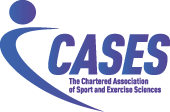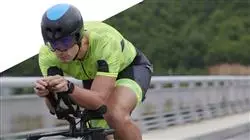University certificate
Scientific endorser

Scientific endorser

The world's largest faculty of sports science”
Introduction to the Program
Sign up now and master the most advanced training techniques to enhance your performance cycling career”

Standing out in cycling, a sport in constant evolution, is very complicated. Even more so when not only the engineering and aerodynamics around bicycles evolve, but also the very way in which cyclists train and face competition. Therefore, it is necessary to acquire solid knowledge and advanced skills in sports planning in this discipline, allowing the professional to take a step forward and stay in the competitive elite.
Under this premise, TECH's Advanced master’s degree in High Performance and Competition Cycling is born, where students will have the opportunity to study in depth high performance training. In this way, they will delve into the most advanced techniques and methodologies for the preparation and development of elite cyclists. To this end, they will analyze special situations of the cyclist, such as injury management, recovery and adaptation to training in different conditions and competition scenarios. They will also examine performance evaluation, delving into the tools and strategies needed to measure, monitor and improve the performance of athletes in this area.
It is, therefore, a unique opportunity for cycling professionals who wish to deepen their knowledge in this field and become highly qualified in training, planning, biomechanics, nutrition and other very important and rigorous specialties.
All this, in addition, in a 100% online mode of study, which allows students to access the program content and learning activities from anywhere in the world, without the need to attend classes in person. The Advanced master’s degree in High Performance and Competition Cycling has no fixed schedules, thus providing the flexibility students need to adapt their learning to their own needs and pace of life.
Enjoy the convenience and flexibility of studying completely online, adapting the learning to your pace and lifestyle”
This Advanced master’s degree in High-Performance and Competitive Cycling contains the most complete and up-to-date scientific program on the market. The most important features include:
- The development of case studies presented by experts in cycling and high performance
- The graphic, schematic, and practical contents with which they are created, provide scientific and practical information on the disciplines that are essential for professional practice
- Practical exercises where self-assessment can be used to improve learning
- Its special emphasis on innovative cycling methodologies and management of cycling teams
- Theoretical lessons, questions to the expert, debate forums on controversial topics, and individual reflection assignments
- Content that is accessible from any fixed or portable device with an Internet connection
Develop in-depth knowledge of injury prevention and management, optimizing cyclists' performance”
Its teaching staff includes professionals from the field of cycling, who bring the experience of their work to this program, as well as recognized specialists from leading companies and prestigious universities.
The multimedia content, developed with the latest educational technology, will provide the professional with situated and contextual learning, i.e., a simulated environment that will provide an immersive learning experience designed to prepare for real-life situations.
This program is designed around Problem-Based Learning, whereby the student must try to solve the different professional practice situations that arise throughout the program. For this purpose, the professional will be assisted by an innovative interactive video system created by renowned and experienced experts.
Be the future of elite cycling thanks to the skills you will acquire in this Advanced master’s degree”

Take advantage of the opportunity to learn from expert cyclists, with experience in international teams and high level competitions”
Why study at TECH?
TECH is the world’s largest online university. With an impressive catalog of more than 14,000 university programs available in 11 languages, it is positioned as a leader in employability, with a 99% job placement rate. In addition, it relies on an enormous faculty of more than 6,000 professors of the highest international renown.

Study at the world's largest online university and guarantee your professional success. The future starts at TECH”
The world’s best online university according to FORBES
The prestigious Forbes magazine, specialized in business and finance, has highlighted TECH as “the world's best online university” This is what they have recently stated in an article in their digital edition in which they echo the success story of this institution, “thanks to the academic offer it provides, the selection of its teaching staff, and an innovative learning method aimed at educating the professionals of the future”
A revolutionary study method, a cutting-edge faculty and a practical focus: the key to TECH's success.
The most complete study plans on the university scene
TECH offers the most complete study plans on the university scene, with syllabuses that cover fundamental concepts and, at the same time, the main scientific advances in their specific scientific areas. In addition, these programs are continuously being updated to guarantee students the academic vanguard and the most in-demand professional skills. In this way, the university's qualifications provide its graduates with a significant advantage to propel their careers to success.
TECH offers the most comprehensive and intensive study plans on the current university scene.
A world-class teaching staff
TECH's teaching staff is made up of more than 6,000 professors with the highest international recognition. Professors, researchers and top executives of multinational companies, including Isaiah Covington, performance coach of the Boston Celtics; Magda Romanska, principal investigator at Harvard MetaLAB; Ignacio Wistumba, chairman of the department of translational molecular pathology at MD Anderson Cancer Center; and D.W. Pine, creative director of TIME magazine, among others.
Internationally renowned experts, specialized in different branches of Health, Technology, Communication and Business, form part of the TECH faculty.
A unique learning method
TECH is the first university to use Relearning in all its programs. It is the best online learning methodology, accredited with international teaching quality certifications, provided by prestigious educational agencies. In addition, this disruptive educational model is complemented with the “Case Method”, thereby setting up a unique online teaching strategy. Innovative teaching resources are also implemented, including detailed videos, infographics and interactive summaries.
TECH combines Relearning and the Case Method in all its university programs to guarantee excellent theoretical and practical learning, studying whenever and wherever you want.
The world's largest online university
TECH is the world’s largest online university. We are the largest educational institution, with the best and widest online educational catalog, one hundred percent online and covering the vast majority of areas of knowledge. We offer a large selection of our own degrees and accredited online undergraduate and postgraduate degrees. In total, more than 14,000 university degrees, in eleven different languages, make us the largest educational largest in the world.
TECH has the world's most extensive catalog of academic and official programs, available in more than 11 languages.
Google Premier Partner
The American technology giant has awarded TECH the Google Google Premier Partner badge. This award, which is only available to 3% of the world's companies, highlights the efficient, flexible and tailored experience that this university provides to students. The recognition as a Google Premier Partner not only accredits the maximum rigor, performance and investment in TECH's digital infrastructures, but also places this university as one of the world's leading technology companies.
Google has positioned TECH in the top 3% of the world's most important technology companies by awarding it its Google Premier Partner badge.
The official online university of the NBA
TECH is the official online university of the NBA. Thanks to our agreement with the biggest league in basketball, we offer our students exclusive university programs, as well as a wide variety of educational resources focused on the business of the league and other areas of the sports industry. Each program is made up of a uniquely designed syllabus and features exceptional guest hosts: professionals with a distinguished sports background who will offer their expertise on the most relevant topics.
TECH has been selected by the NBA, the world's top basketball league, as its official online university.
The top-rated university by its students
Students have positioned TECH as the world's top-rated university on the main review websites, with a highest rating of 4.9 out of 5, obtained from more than 1,000 reviews. These results consolidate TECH as the benchmark university institution at an international level, reflecting the excellence and positive impact of its educational model.” reflecting the excellence and positive impact of its educational model.”
TECH is the world’s top-rated university by its students.
Leaders in employability
TECH has managed to become the leading university in employability. 99% of its students obtain jobs in the academic field they have studied, within one year of completing any of the university's programs. A similar number achieve immediate career enhancement. All this thanks to a study methodology that bases its effectiveness on the acquisition of practical skills, which are absolutely necessary for professional development.
99% of TECH graduates find a job within a year of completing their studies.
Advanced Master's Degree in High-Performance and Competitive Cycling
At TECH Global University, we understand that high performance and competition cycling is a discipline that requires a high level of specialization and technical knowledge. For this reason, we have designed our Advanced Master's Degree in High-Performance and Competitive Cycling, aimed at those professionals and cycling enthusiasts who wish to achieve excellence in this sport. In our online classes, you will be guided by experts in the field, who will provide you with the necessary tools to optimize the performance of cyclists in high-level competitions.
In this online program, key topics such as cycling-specific physical preparation, training planning, sports nutrition, biomechanics applied to cycling, and performance analysis and control will be addressed. In addition, tactical strategies and sports psychology for competition will be covered in depth. Our goal is to provide you with a comprehensive and up-to-date education, which will allow you to excel in the world of high-performance and competitive cycling, either as a coach, athlete or in any other role related to this exciting sport. Enroll in our Advanced Master's Degree in High-Performance and Competitive Cycling and become an expert in the subject!







